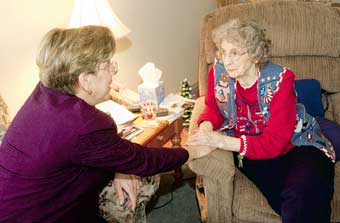
back

|
 |
Seniors often lonely in nursing homes
By Matt Monaghan, the Statesman Journal
January 27, 2004

Laurey Lee (left) sits with her mother-in-law, Helen Lee, at River Road Assisted Living Residence last month. Laurey Lee is sure to contact her mother-in-law every day.
KEIZER — Helen Lee sits in her room at River Road Assisted Living Residence talking with her daughter-in-law, Laurey, about a musical duo who performed at the center the night before.
Having someone to talk to and keep her up-to-date on her 90 grandchildren and great-grandchildren is one of the reasons Helen likes it when Laurey comes to visit.
“She’s an angel,” the 87-year-old Helen Lee says of Laurey, who makes a point to contact her mother-in-law every day.
One of the greatest fears of growing old is living in a nursing home and being forgotten. Visits from friends and relatives are rare and brief, or are made as an obligation instead of out of a desire to see loved ones.
While Helen Lee feels fortunate to have the support of her family, others in her position aren’t so lucky.
The absence of family contact can result in the onset of loneliness and depression, something that poses a daily challenge for River Road administrator, Sue Miller.
“It’s hard for them to lose that contact, especially when they’re having to get used to a loss of independence,” Miller says.
Lee came to River Road 15 months ago when her caregiver in Milton-Freewater informed her family that she no longer could take care of her.
Though she is grateful for the support and help of the River Road staff, she is quick to point out that her current living situation wasn’t her idea.
“I miss my home, and I miss my husband,” Lee says. “It gets lonely here at night and so I’ll look up at his picture and I’ll talk to him.”
Ross Lee passed away in March 2001. The couple had been married since Christmas day 1939.
Outside in the hallway, Walter Miller walks slowly toward the dining hall.
The friendly, soft-spoken 80-year-old with a glistening head of white hair says he misses having his boys around for the holidays.
“They have very little time, so usually they’re here for an hour or so and then they have to go,” says Miller, whose mobility is limited by a walker.
Not being able to get around is one of the reasons family and friends find it difficult to make loved ones a part of their holiday festivities.
With that in mind, River Road invites its residents’ relatives to take part in special holiday events and meals at the living facility.
A Christmas dinner of Cornish game hen was on the menu this year at River Road.
“We realize that transporting and taking them home can be difficult so this way they can still eat with their family.”
Ironically, family for the residents tends to become the caregivers with whom they interact and depend on for their daily needs.
For Wanda Piaskiewicz, who recently lost some of her cognitive abilities and has no local family, the River Road staff has become more familiar to her than her own loved ones.
The 89-year-old former lingerie designer from New Jersey — who speaks with just a hint of an East Coast accent — has trouble remembering how she came to live at River Road.
Sue Miller fills in the gaps for Wanda, explaining that she stayed behind at the living center when her son, Mark, moved back to New Jersey after being laid off from his job in Salem.
“Sometimes I’m not really sure that she knows Mark is gone,” Miller says, “but I love her. She’s a sweet lady.”
Copyright © 2002
Global Action on Aging
Terms of
Use | Privacy
Policy | Contact Us
|



